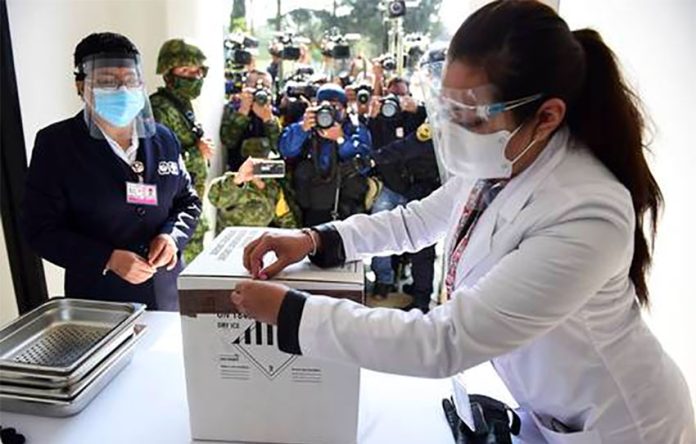Mexico will not begin inoculating health workers against Covid-19 on Tuesday as planned because a first batch of 250,000 doses of the Pfizer/BioNTech vaccine has not yet arrived.
However, Foreign Minister Marcelo Ebrard said Tuesday morning that the shipment was in transit and will arrive in Mexico Wednesday.
The federal government had announced that it would begin administering the Covid-19 vaccine to health workers in Mexico City and Coahuila on Tuesday.
The first 250,000 doses of the Pfizer/BioNTech vaccine – Mexico has signed an agreement to purchase 34.4 million doses – were supposed to arrive from United States on Monday.
The Coahuila government attributed the delay to logistical problems at Pfizer.
Ebrard, who has taken a leading role in the government’s efforts to secure access to Covid-19 vaccines, said in late November that the Pfizer/BioNTech could arrive in Mexico five days after the health regulatory agency Cofrepris approved its use here.
But more than twice that length of time has passed since approval was announced on December 11.
As is the case in many countries around the world, authorities and citizens alike are eagerly awaiting the rollout of the vaccine as coronavirus case numbers and Covid-19 deaths continue to mount.
Mexico’s accumulated case tally rose to 1,325,915 on Monday with 5,370 new cases reported while the official death toll increased to 118,598 with 396 additional fatalities registered.
The government of Coahuila, which was an early hotspot in Mexico’s coronavirus pandemic and ranks seventh among the 32 states for accumulated cases, said it had “everything ready” to administer the first Covid-19 vaccines and was just waiting for the doses to arrive.
A shipment of thousands of syringes arrived in the state on Saturday and preparations were made to inoculate health workers at military facilities in Saltillo, Torreón and Piedras Negras.
![]()
Military facilities and hospitals in Mexico City had also prepared to being administering vaccines on Tuesday.
The delay in the arrival of the first doses of the Pfizer/BioNTech vaccine is a setback for the federal government, which has been widely criticized for its handling of the pandemic.
Some doctors believe that the government will also bungle the distribution and application of Covid-19 vaccines.
Dr. Francisco Moreno, head of the Covid-19 unit at the private ABC medical center in Mexico City, told The Los Angeles Times that “the management of the pandemic has been so bad that we are not optimistic about how the vaccine is going to be managed.”
“The people at the top are not doing what has to be done,” he said.
A veteran doctor at at Mexico City public hospital identified only as Claudia said: “We are living in a catastrophe right now — we have patients sharing one tank of oxygen and there is a shortage of everything: ventilators, beds, medicines, safety gear, medical personnel. I have faith in the effectiveness of the vaccine. But I have no faith in the abilities of authorities to handle the logistics of vaccination, because they have demonstrated that they are not capable.”
In addition to the Pfizer/BioNTech, the federal government has agreements to purchase 77.4 million doses of the AstraZeneca/Oxford University vaccine and 35 million doses of China’s CanSino Biologics vaccine.
But their approval in Mexico and delivery is not expected until sometime next year. According to the vaccination plan presented by the government on December 8, one million doses of the Pfizer/BioNTech vaccine will arrive in Mexico in each of January, February and March and a shipment of 12 million doses is expected in April
But even if all those shipments, and the 250,000 doses expected to arrive before the end of the year, reach Mexico as scheduled, only 7.6 million people will have been vaccinated by the end of April as each person must be given two shots three weeks apart.
That figure would represent less than 6% of Mexico’s population of almost 130 million, leaving the majority of citizens susceptible to developing a serious Covid-19 illness. Mexico’s pandemic – one of the worst in the world in terms of case numbers and deaths – appears unlikely to end any time soon.
Source: El Universal (sp), El Sol de México (sp), La Silla Rota (sp), Milenio (sp), The Los Angeles Times (en)
